Are you trapped in a Snapchat nightmare, and don’t know when you’re being blackmailed, or facing extortion threats, or what to do? Let’s face it. Snapchat can be a fun way to connect with friends. But what happens when this fun turns into fear? This app, one of the leading social media platforms, is largely being used by cybercriminals to blackmail, harass, and scam thousands of unsuspecting victims. With disappearing messages on Snapchat, the platform has become a breeding ground for sexting, bullying, and even blackmail.
If you’re reading this because you’re being threatened for whatever reasons, with the majority of it being the release of private photos and videos, remember, you are not alone. This is a serious situation, but there is help available. In this guide, we will walk you through various steps you can take to protect yourself, gather evidence, and fight back against online extortion. Besides this, we will also share stories of how others online overcame such threats of blackmail.
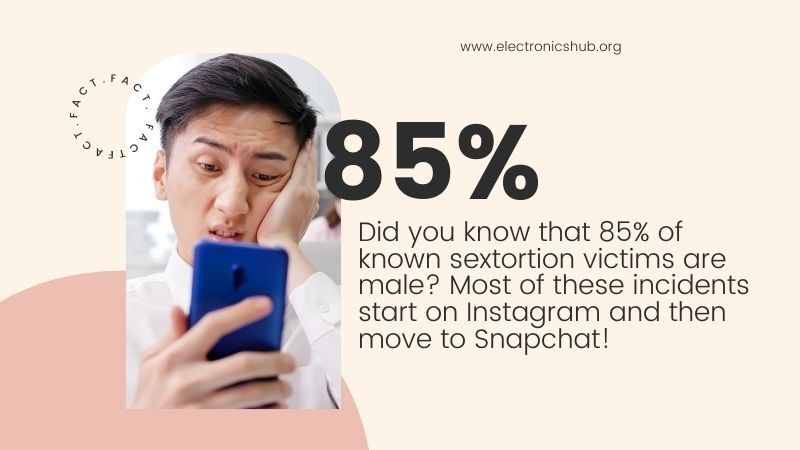
Outline
Toggle- Can You Or Anyone Be Blackmailed On Snapchat?
- So, What To Do If Someone Is Blackmailing You On Snapchat?
- Sextortion And Blackmail On Snapchat: Insights From Online Communities
- Should I Reach The Police About Snapchat Extortion?
- Reporting Snapchat Sextortion: What To Expect From The Police
- Snapchat Extortion & Blackmail: How A Lawyer Can Help
- Reporting Snapchat Extortion And Getting Help
- 10 Snapchat Scams To Watch Out For
- Healing After Snapchat Extortion: Steps To Cope With Stress And Trauma
- FAQs:
- Conclusion
Can You Or Anyone Be Blackmailed On Snapchat?
Yes, anyone on Snapchat can be blackmailed. The disappearing messages feature can lull users into a false sense of security, making them more likely to share sensitive content. In reality, blackmailers can easily screenshot or screen-record evidence and Snapchat’s anonymity allows them to operate under fake profiles.
Here’s why and how it happens:
Why Snapchat Is Vulnerable To Blackmail
- Disappearing Messages: As said, the very feature that makes Snapchat popular – messages disappearing after viewing – can lead to a false sense of security. People might be more willing to share compromising content assuming it vanishes. However, blackmailers can easily take screenshots or screen recordings to capture the content.
- Anonymity: Snapchat allows creating accounts with limited personal information, making it easier for blackmailers to stay anonymous.
- Trust: The platform is often used between friends, lowering suspicion and making users more susceptible to manipulation.
How Blackmail Happens On Snapchat
- Sextortion: A blackmailer might trick or pressure someone into sending nude photos or videos, threatening to release them if the victim doesn’t comply with their demands (money, additional photos, etc.).
- Fake Identities: Someone might create a fake profile to build trust and then lure the victim into sending sensitive content.
- Sharing Existing Content: A blackmailer might gain access to compromising photos or videos through other means (hacking, shared devices) and use them for blackmail.
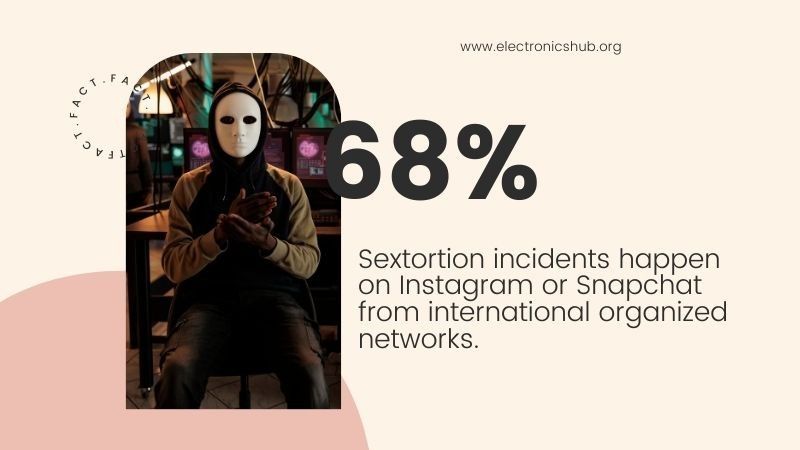
In my opinion, another big reason apart from disappearing messaging is that the blackmailer or the scammer can actually see your location at all times. They contribute to fear-mongering.
Ultimately, people are faced with blackmail on Snapchat, and this is concerning as teenagers and young adults are most susceptible.
- Teenagers (13-19): This is a prime target for sextortion scams due to the factors mentioned above.
- Young Adults (20-25): This age group is more susceptible to fake identities or sharing existing compromising content through casual encounters.
Taking advantage of these features, cybercriminals are luring victims, manipulating them into sending explicit content, especially nude pictures, and ultimately threatening, scaring users, and asking them for huge money or exchanges. If the user fails to share, the blackmailers are using and sharing these pictures, or explicit content all over social media, causing harm.
So, What To Do If Someone Is Blackmailing You On Snapchat?
When someone is blacking or extorting you on Snapchat, make sure you take immediate and informed action without any worry. To help you with this, we’ve outlined all possible steps that help you protect yourself, and handle these distressing situations methodically.
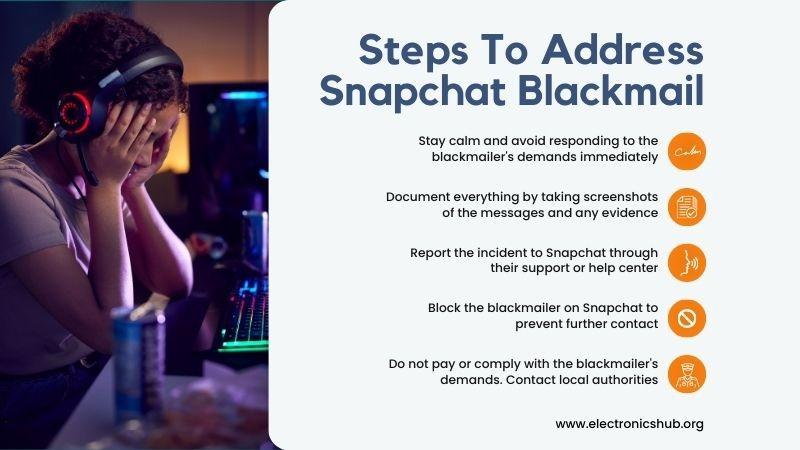
Essential Steps To Address Snapchat Blackmail
- Enhance Your Privacy Settings: Immediately tighten your Snapchat privacy controls to limit incoming messages to known contacts only. Disable location services and any other optional features that might provide additional information to potential blackmailers. Ensuring your digital footprint is minimal can be a crucial preventive measure.
- Document All Evidence: It’s vital to capture and save all interactions with the blackmailer. Use Snapchat’s functionalities such as message saving or pinning to keep important conversations at the top of your chat list. Take screenshots of all messages, noting usernames, the content of threats, and timestamps. Secure these details in a safe location as they are critical for any legal action.
- Cease Communication: Do not engage further with the blackmailer. Any communication, whether attempting to negotiate or confront, can exacerbate the situation. If unavoidable, delay responses and provide vague excuses to buy time while you seek help from authorities or cyber experts.
- Report The Blackmailer: Use Snapchat’s reporting features to inform them of the misuse on their platform. This can lead to the perpetrator’s account being investigated and possibly deactivated, stopping them from causing further harm.
- Seek Support Systems: Disclosing the situation to trusted friends or family can provide emotional and practical support. Being a victim of blackmail can be isolating, but having a support network can alleviate stress and assist in decision-making processes.
- Engage Authorities: Reporting the incident to local law enforcement and the FBI’s Internet Crime Complaint Center is essential. They can offer guidance and, in some cases, intervene to halt the blackmailer’s actions. Local law enforcement and specialized cybercrime units have the tools to track digital footprints and enforce the law.
Proactive And Supportive Measures
- Secure Digital Accounts Across Platforms: Extend your security settings beyond Snapchat to all social media, email, and personal accounts to prevent further intrusions.
- Consult Cyber Security Experts: Professionals specializing in internet security and cyber law can provide advice specific to your situation, helping to secure your online presence and pursue legal action if necessary.
- Stay Informed And Educated: Regularly update yourself on the latest digital safety protocols. Knowledge of current cybersecurity trends and preventive measures can significantly deter potential blackmailers.
Sextortion And Blackmail On Snapchat: Insights From Online Communities
We analyzed communities online to understand the most common and popular pieces of advice the victims and experts in the industry share. As said, if you’ve been a victim of blackmailing, extortion, or any other scam on Snapchat, know that you’re not alone, and there is a pathway to safety outlined.
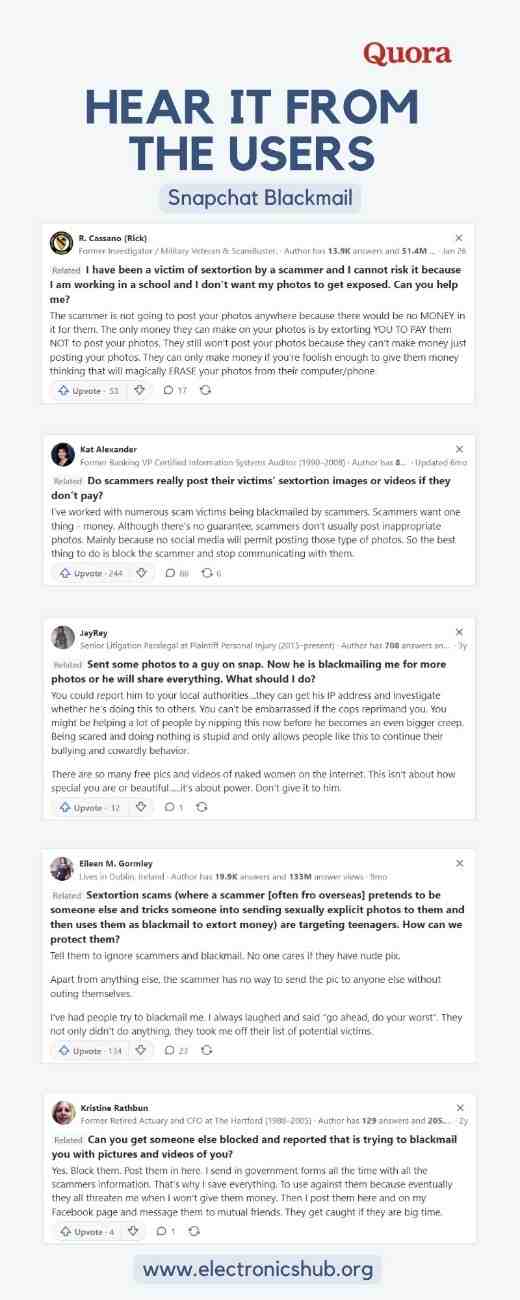
What Snapchat Blackmail Victims Share
Many individuals who’ve faced these threats share a consistent message: the importance of staying calm and not engaging with the blackmailer. Most recount their initial panic, followed by a resolve not to comply with the demands. The consensus is clear—paying the blackmailer doesn’t guarantee safety but rather can prolong your vulnerability. Victims strongly advocate for immediately ceasing all communication.
Insights From Experts Experts in the field of digital security underscore a few critical actions:
- Secure Your Digital Life: Update your privacy settings and passwords.
- Gather Evidence: Keep records of all communications, which can be crucial for investigations.
- Report The Incident: Notify Snapchat’s support team and local law enforcement. Legal professionals and cybersecurity experts often stress the importance of bringing in authorities who can employ proper measures to track and stop the blackmailer.
The Role Of Technology Specialists
Some victims turn to cybersecurity specialists who can help by removing or securing the compromised data. These tech experts sometimes work behind the scenes to retrieve or delete private content from unauthorized hands, potentially mitigating the risk of widespread exposure. If you think you want to delete your Snapchat account for good, then do click on the link to learn more.
Community Support
One of the most highlighted resources is community support. Online forums and support groups are pivotal, providing both emotional reassurance and practical advice. Hearing how others have navigated similar threats reinforces the recommended steps and underscores that no one should face this alone.
Should I Reach The Police About Snapchat Extortion?
Absolutely, you should report Snapchat extortion to the police. Extortion is a serious crime, and involving the authorities is the best course of action to protect yourself and potentially others from this individual. Here’s why:
- Law enforcement Has The Resources To Investigate. The police have experience dealing with these situations and can track down the perpetrator. They have tools to gather evidence, such as tracing IP addresses and issuing subpoenas to social media platforms to obtain account information.
- Reporting Creates A Record Of The Crime. Filing a report establishes a documented history of the extortion attempt. This record can be crucial if the situation escalates or if the police need evidence to build a case.
- You Are Not Alone. Law enforcement encounters online extortion frequently. They understand the fear and pressure victims face, and their role is to help, not judge.
What NOT To Write To The Blackmailer
As someone who’s witnessed such cases, I strongly advise against responding to the extortionist’s threats or demands. Engaging with them can embolden them and make the situation worse. The police can guide you on appropriate communication strategies if necessary.
Reporting Snapchat Sextortion: What To Expect From The Police
When you officially file a complaint, or report to the police about the sextortion on Snapchat, here’s what you can expect from the police. In the below sections, we’ll explain what the officers may ask you, what you would be expected to do, and more about the investigation process.
Understanding And Support
- The officers will likely ask you to explain what happened in detail. Be prepared to recount the events, but don’t feel pressured to share anything you’re uncomfortable with. They’ll want to know how the sextortion began, the nature of the messages, and any threats made.
- The officers will be understanding and there to help. They deal with these situations regularly and understand the emotional toll they can take. Don’t feel ashamed or embarrassed to report the crime.
- The officers may ask you to preserve evidence. This could involve showing them the incriminating messages or screenshots (if you have them safely stored) and potentially helping you secure your device.
The Investigation
- The officers will likely explain the investigation process. They may ask for usernames, phone numbers, or any other information that could help identify the perpetrator.
- Depending on the complexity of the case, the investigation might take time. It could involve contacting Snapchat for user information, tracing online activity, or interviewing potential witnesses.
- The officers may or may not be able to keep you updated on every detail. Investigations can have twists and turns, and revealing sensitive information could compromise the case. However, they should be able to answer your questions about the overall process.
Next Steps
- The officers will discuss potential outcomes based on the investigation. This could involve pressing charges against the perpetrator or taking steps to have them deactivate their account.
- The officers might offer resources and support services. They may connect you with hotlines or support groups that specialize in helping victims of sextortion.
Remember
- Throughout the process, the officers should treat you with respect and confidentiality. They are there to help you navigate this difficult situation and bring the perpetrator to justice.
- Added to that, do not stress over it. You are not the criminal here, it is the blackmailer. You made the right decision to report such crimes, and illegal activities taking place on social media platforms.
Snapchat Extortion & Blackmail: How A Lawyer Can Help
While reporting to the police is crucial, a lawyer can be a valuable asset in navigating the legal complexities of Snapchat extortion. Here’s how they can assist you:
- Preserving Evidence: A lawyer can guide you on properly collecting and documenting evidence, such as screenshots, messages, and usernames, to ensure it’s admissible in court.
- Reporting And Communication: They can help you file a formal police report and potentially draft a cease-and-desist letter to the blackmailer, discouraging further contact.
- Understanding Your Rights: Lawyers can explain your legal rights and options, including pursuing civil lawsuits against the perpetrator for damages.
- Investigation Support: They can work with law enforcement to gather additional evidence, potentially through subpoenas to social media platforms or tracing online activity.
- Negotiation And Representation: In some cases, a lawyer may be able to negotiate with the blackmailer on your behalf, minimizing potential harm or the release of compromising content.
- Protecting Your Reputation: If the extortion attempt involved the threat of exposing sensitive photos or videos, a lawyer can advise on damage control strategies to minimize the impact on your reputation.
What You Should Know:
- Look for a lawyer experienced in cybercrime and online extortion. They will understand the nuances of these cases and have the legal expertise to protect your interests.
- While legal fees can be a concern, some lawyers offer free consultations or work on a contingency basis, meaning they only get paid if they win your case.
Reporting Snapchat Extortion And Getting Help
While Snapchat doesn’t have a dedicated hotline, there are multiple avenues to report extortion and access support. Here’s a comprehensive guide:
Reporting To Snapchat
- In-App Reporting: If you’re being blackmailed on Snapchat, here’s how to report it directly within the app:
- Open the Snapchat app and go to the chat with the blackmailer.
- Tap and hold on to their username.
- Select “Manage Friendship” and then “Report.”
- Choose the reason for reporting that best fits the situation (e.g., Harassment or Bullying).
- In the description box, provide clear details about the extortion attempt, including specific examples of threats and any usernames or usernames mentioned.
- Report via Web Form: For a more detailed report, utilize the online form at https://help.snapchat.com/hc/en-us/articles/7012399221652-How-do-I-report-abuse-or-illegal-content-on-Snapchat. Here, you can attach screenshots or other evidence (if safe to do so) to strengthen your report.
Snapchat Extortion: Seeking External Help
- Law Enforcement: Contacting your local police department to file a formal report is crucial. This initiates a legal investigation and increases the chances of apprehending the perpetrator.
- National Cybersecurity Alliance: Another option worth considering is reading out to the NCA. This organization provides resources and guidance on online safety, including dealing with extortion. Visit their website at https://staysafeonline.org/
- Cyberbullying Research Center: They offer support and resources for victims of cyberbullying, which can often overlap with online extortion. You can find them at https://cyberbullying.org/.
- Crisis Text Line: Text HOME to 741741 for free, 24/7 crisis support if the extortion is causing overwhelming stress or suicidal thoughts.
10 Snapchat Scams To Watch Out For
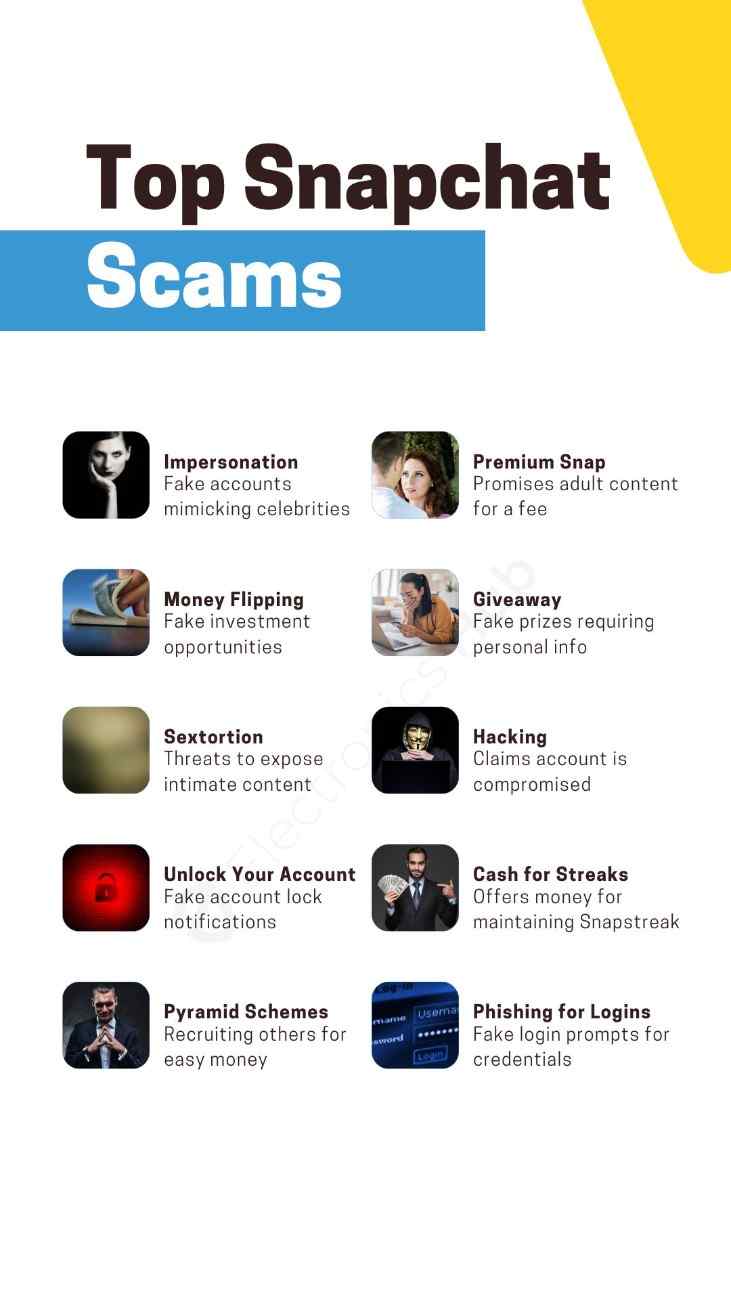
1. Impersonation Scams: Imagine getting a message from your favorite celebrity! But it might be a fake. Scammers create accounts mimicking celebrities, influencers, or even your friends. They might chat casually, then hit you up for money or personal details like birthdays or addresses.
Example: You get a message from “Kylie Jenner” asking to borrow money for a last-minute charity event.
2. “Premium Snap” Scams: A user with a suggestive username or profile picture promises exclusive “adult content” for a fee. You send them money (often through prepaid gift cards), but they vanish without delivering anything.
Example: A user named “HotStreaks_99” promises nude snaps if you send them $20 via a gift card code.
3. Money Flipping Scams: Someone you barely know approaches you with a “foolproof” investment opportunity. They claim to be able to turn a small amount of your money into a huge return quickly. It’s a lie – they’ll take your money and disappear.
Example: A user you met through a mutual friend messages you about a new cryptocurrency that’s “guaranteed to double your money in a week.”
4. Giveaway Scams: A message pops up congratulating you on winning a brand new phone or a stack of gift cards! But to claim your prize, you need to click a link or provide your personal information. Clicking the link could lead to a malicious website or download malware.
Example: You receive a notification saying you’ve won a new iPhone in a random Snapchat draw. To claim it, you need to click on a link and enter your shipping address.
5. Sextortion Scams: Someone you befriend online convinces you to share intimate photos or videos. Then, they threaten to expose them to your friends and family unless you send them money or perform other actions.
Example: You start chatting with someone who seems nice. They ask you to send a flirty picture, then threaten to send it to everyone on your Snapchat if you don’t send them more explicit content.
6. Hacking Scams: A message arrives claiming your account is compromised or needs an update. It urges you to click a link or download a file to fix the issue. These links or files can be malicious, designed to steal your login information or infect your device with malware.
Example: You receive a message stating your Snapchat account has been flagged for suspicious activity. Clicking the provided link will “verify” your account, but it could be a phishing attempt.
7. “Unlock Your Account” Scams: A message warns you that your Snapchat account has been locked due to a violation of their terms. To unlock it, you need to click a link and verify your identity. Don’t fall for it – it’s likely a phishing attempt to steal your login information.
Example: You see a message saying your account is locked because you accidentally sent a nude snap. Clicking the link to “unlock” it will take you to a fake Snapchat login page.
8. “Cash For Streaks” Scams: Someone offers you money to maintain a long Snapstreak with them (sending Snaps back and forth for consecutive days). It’s a waste of time and Snaps – there’s no real payout at the end.
Example: A user you barely know messages you, willing to pay $1 for every day you keep your Snapstreak going with them.
9. Pyramid Schemes: You’re invited to join an “exclusive” business opportunity on Snapchat. They promise easy money by recruiting others to join the scheme. These are pyramid schemes that often collapse, leaving you with nothing.
Example: A friend messages you about a new “work-from-home” opportunity on Snapchat where you earn money by signing people up under you.
10. Phishing For Logins: Deceptive messages or links appear to be from Snapchat, urging you to enter your login credentials to fix a problem or update your account. Never share your login information through unsolicited messages.
Example: You receive an email that looks like it’s from Snapchat security, claiming your password needs to be updated immediately. Clicking the link in the email takes you to a fake login page designed to steal your credentials.
Healing After Snapchat Extortion: Steps To Cope With Stress And Trauma
Being targeted by a Snapchat extortionist can be a frightening and stressful experience. It’s important to remember you’re not alone, and there are steps you can take to heal from the emotional impact. Here are some tips to manage the stress and trauma:
- Seek Support: Confide in a trusted friend, family member, therapist, or counselor. Talking about your experience can be incredibly helpful in processing your emotions and regaining a sense of control. Support groups specifically for sextortion victims can also be a source of understanding and shared experiences.
- Practice Self-Care: Prioritize activities that promote relaxation and well-being. This could involve exercise, meditation, spending time in nature, or engaging in hobbies you enjoy. Taking care of yourself physically and mentally will help you cope with the emotional strain.
- Limit Social Media: Stepping away from social media, particularly Snapchat for a while, can help reduce anxiety and the feeling of being constantly monitored. Consider taking a break or deactivating your account temporarily.
- Focus On The Facts: Remind yourself that you are not to blame for the extortion attempt. The perpetrator is the one who committed the crime. Focus on the positive steps you’re taking to address the situation and regain control.
- Challenge Negative Thoughts: Extortionists often use manipulation and threats to instill fear and shame. Challenge these negative thoughts. Remember, you are the victim, and the shame lies entirely with the perpetrator.
- Document Everything: If possible, keep screenshots of the messages or any other evidence of the extortion attempt. This can be helpful for law enforcement if you decide to report the crime.
FAQs:
Even with disappearing Snaps, recipients can use screen recording tools or exploit features like Replay to save them. Don’t send anything you wouldn’t want leaked.
This is a common tactic. Never give out personal information on Snapchat, especially to strangers. Report and block them.
Phishing scams often target Snapchat users. Links promising free features or rewards are likely attempts to steal login details. Don’t click!
Adjust your privacy settings to control who sees your story on Snapchat. Even with a basic friend list, anyone who adds you can potentially see your story if settings allow.
Be wary of accounts claiming to be celebrities, especially if they ask for money or personal information. Report and block them. Remember, celebrities wouldn’t reach out this way.
Change your username and enable two-factor authentication for added security. Consider taking a break from Snapchat or creating a new account with stricter privacy settings.
Technically, My Eyes Only Snaps are encrypted, but there’s always a risk if someone gains access to your phone. Don’t store anything super sensitive there and be mindful who you let use your device.
In some cases, with a warrant, law enforcement may be able to retrieve deleted Snaps from Snapchat’s servers. This highlights the importance of reporting the blackmail and cooperating with authorities.
Conclusion
In confronting the unsettling reality of sextortion and blackmail on Snapchat, this blog post aimed to provide you with a clear roadmap, informed by the collective wisdom of those who have faced similar challenges and the experts who assist them. From taking immediate protective actions to leveraging community and professional support, the steps outlined here are designed to empower you and enhance your safety.
Did you find the guidance in this blog post helpful? If you have any other strategies that worked for you or if there’s more you’d like to understand about handling such situations, please share your thoughts in the comments below. Remember, you’re not alone in this, and sharing your experiences can strengthen the entire community against these digital threats.

